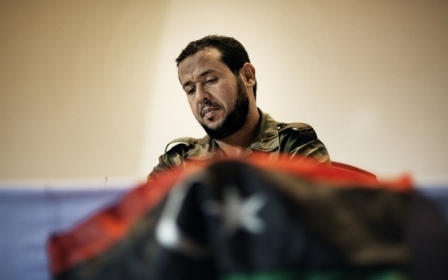East Libyans protest against order curtailing travel abroad

An order preventing men and women ages 18-45 in eastern Libya from travelling abroad without first obtaining security clearances is being met with outrage.
The regional military governor, Abdul Razzak Al-Naduri, insists the order was given to stop people joining terrorist groups in other countries.
It comes only two days after the suspension of a widely ridiculed decree that banned women under 60 from leaving eastern Libya unaccompanied. This was also for “security purposes” and not religiously motivated, Naduri said.
The new order has provoked fury on social media and among Libyans. “Are we living in Gaddafi’s time again? This is not freedom, this is not liberation,” Abdullah, a teacher from Benghazi, told MEE.
“Trust me, I am all for securing my country. But this is a step too far and an infringement on basic human rights,” he said.
A person inside the military who asked to remain anonymous reiterated Naduri’s claim that the decision was in the interests of national security.
Clearance would be quick to obtain, he claimed. It was also intimated that officials would need to keep a log of those leaving the country, again to protect Libya.
However, the fact that permission may be given with supposed ease has done little to quell the frustration of many Libyans.
“It is the principle that counts,” said Ali, a student, also from Benghazi. “I should be allowed to go where I want, when I please. Slowly but surely, I think the rights Libyans fought so hard for are being eroded.”
“Don’t get me wrong; Benghazi is safer than it has been for years. I am thankful for all the LNA (Libyan National Army, which controls eastern Libya) has done. But at what cost?” he added.
The new order will only affect the sole functioning international airport in eastern Libya, at Labraq, in Beida. It is possible that Libyans could fly to Tripoli and then catch an international flight from there. The capital is controlled by the UN-backed government, which has lambasted the decision.
In the decree, Nadouri argues: “The new ban has nothing to do with undermining personal freedom.”
Ali scoffs at this. “If this is not taking away our freedom, then what is? I am sure this man does not understand the meaning of ‘freedom’ when he issues statements like this.”
The criteria for an exit permit are vague. Certificates are required from employers and different ministries handling applications from certain professions.
Yet, quietly, some are in favor of the move.
Hamid points to the fact that some Libyans have joined the Islamic State group and thinks boosting security is not a bad thing.
“If you have done nothing wrong, then everything will be OK,” he said. “I don’t understand why everyone isn’t happy that the military wanting to bolster our safety; it should be seen as a good thing,” Hamid said.
The original decree, frozen this week and replaced by the current ruling, banned women under 60 from travelling abroad without a male chaperone. Widely ridiculed, the authorities insisted it was to prevent women from contacting foreign intelligence services, rather than being motivated by religious reasons.
The new decision is being seen as a face-saving maneuver, to deflect accusations that LNA officials are being influenced by Salafist elements.
'Freedom is not asking someone’s permission to leave. That is what Gaddafi did' - Mohamed
Increasingly, fundamentalist Islamist preachers are beginning to creep into eastern Libya under the protection of the LNA. This is in spite of its military leader, Field Marshal Khalifa Haftar, and his anti-Islamist stance.
Controversial cleric Osama Al-Otaibi is just one of many Madkhali Salafi preachers who have been invited recently to speak at Friday prayers in Benghazi. While not everyone receives them well, locals say they are gaining traction among segments of the population.
Last month, authorities in Marj (where Hafter is based) confiscated a raft of books on Sufism, Shiism, Judaism and atheism. The decision was hammered by international organisations, but praised by Otaibi, who called such publications threats to Libyan society.
Mohamed is studying in China, but is originally from Benghazi. He said he is watching from Beijing with despair. “I wanted to come home soon, but I am scared I won’t be able to leave and continue my studies. They could accuse me of speaking to Chinese intelligence, like they did with Libyan women going abroad,” he said over the phone.
“I fought in the revolution. I watched my cousin die so we could free ourselves from that dictator [Gaddafi]. We called for peace, for freedom and for a stable, prosperous Libya. But sometimes I wonder what was it all for,” he said.
“Freedom is not asking someone’s permission to leave. That is what Gaddafi did.”
Stay informed with MEE's newsletters
Sign up to get the latest alerts, insights and analysis, starting with Turkey Unpacked
Middle East Eye delivers independent and unrivalled coverage and analysis of the Middle East, North Africa and beyond. To learn more about republishing this content and the associated fees, please fill out this form. More about MEE can be found here.




